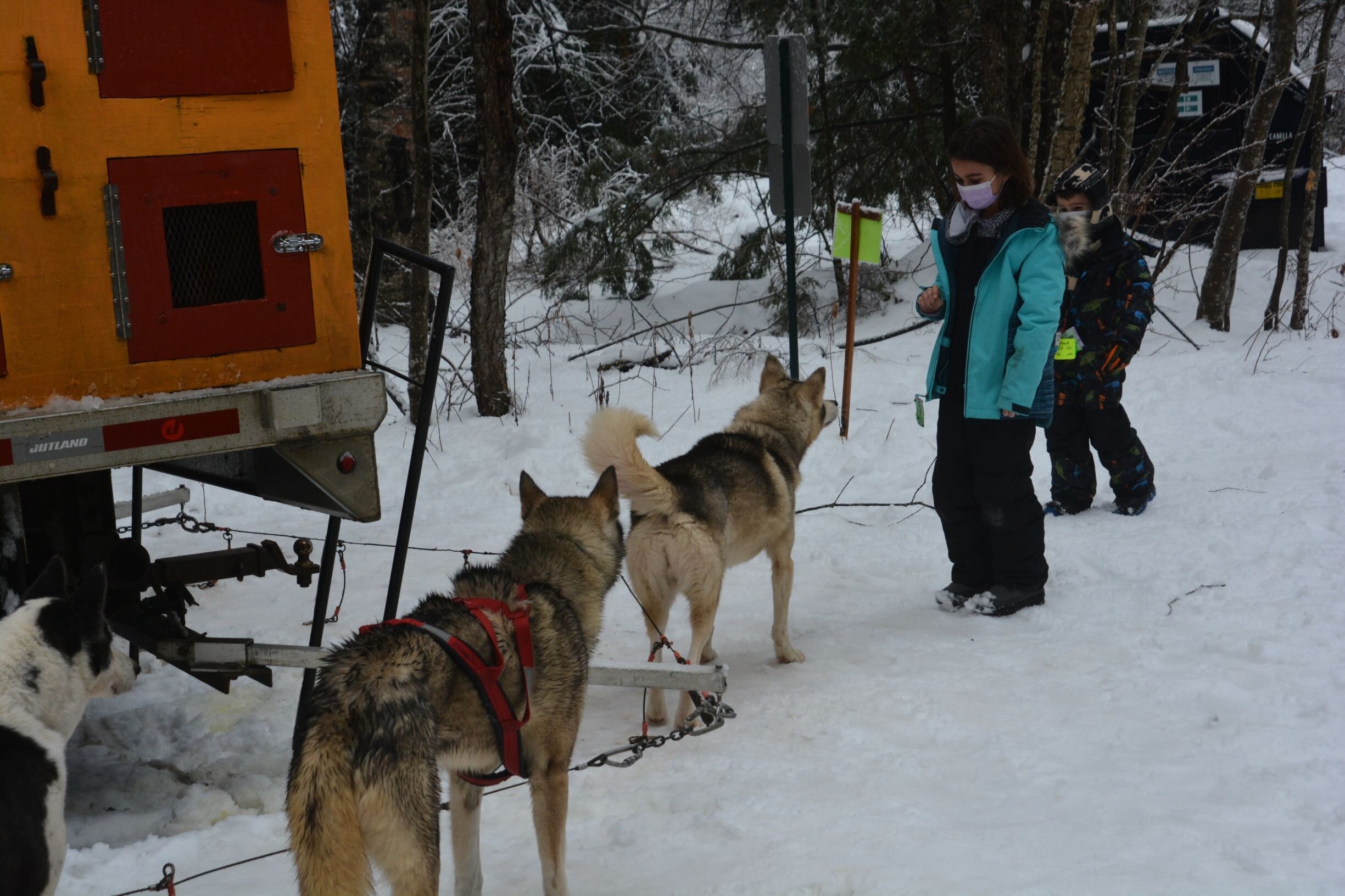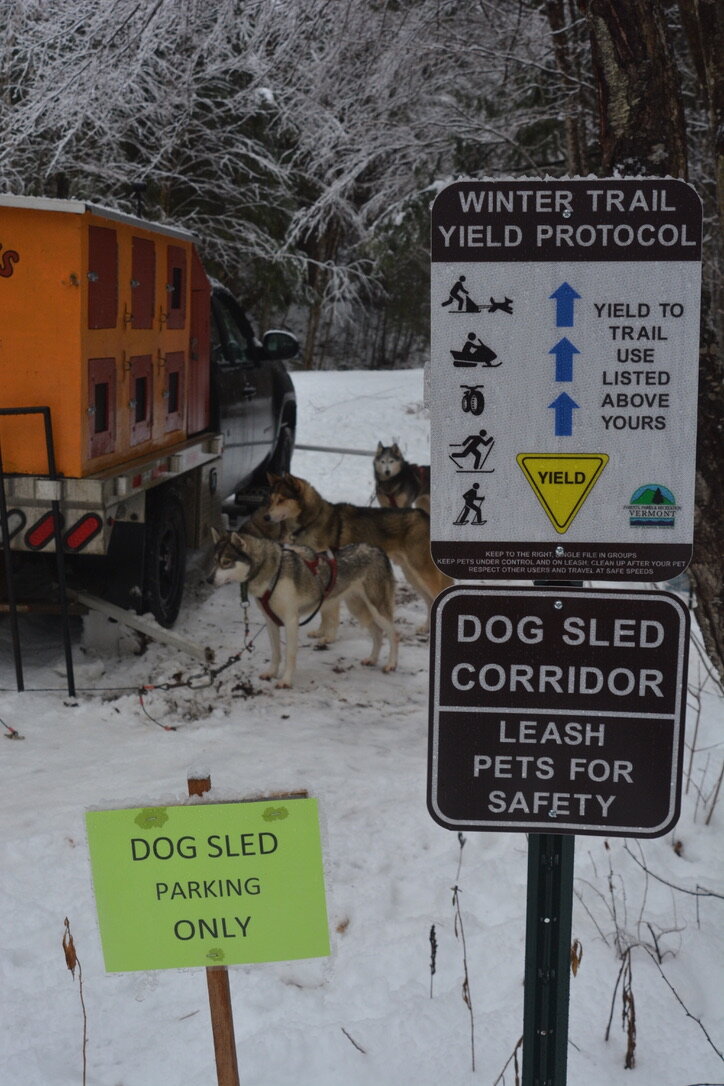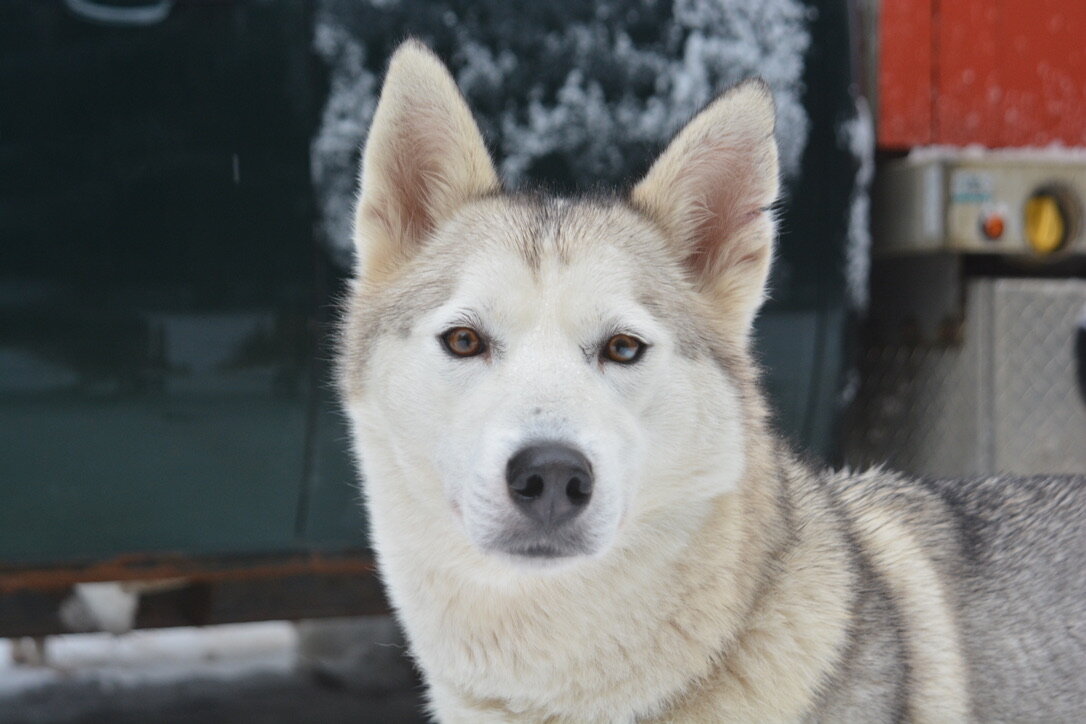Keeping a winter tradition: Mushing at Little River with October Siberians
January 26, 2021 | By Jesse McDougall









Winter recreation is popular in Waterbury but a recent search for something beyond the ever-popular skiing, ice skating and sledding led to Little River State Park to see a niche sport that’s centuries old. This is the sport of dog sledding, otherwise known as mushing.
Rob Farley owns October Siberians, a kennel offering dog sled tours around Waterbury and Stowe. Farley has been mushing for 25 years and now has 19 Siberian huskies bred and trained at his home in Hinesburg.
The sled tours are a second source of income for Farley, who works in hazardous waste management for the state Department of Environmental Conservation. He said COVID-19 made his Christmas mushing tour season “a bust,” but as he spoke about his passion, a family pulled into the parking lot, excited to take their first dog sled ride. The dogs responded with excitement as they yipped, shaking off falling snow.
“These dogs live for sledding,” explained Farley, “but you have to be a little crazy to make it work.” He’s driven across Vermont and into Quebec to find like-minded enthusiasts who train and attend races.
At home, Farley buys his dog food by the ton and emphasized the special relationship one must maintain with the dogs. “Huskies are intelligent and friendly but not always obedient. They’ll tilt their heads and ask you, what’s in it for me?”
Of course, huskies are high-energy, and prospective owners should understand the commitment involved in accommodating husky behavior. “You don’t want to find out the hard way,” Farley said. Once harnessed to a sled, however, huskies excel, he noted.
Farley doubled down on his love of mushing and explained his passion for the sport: “Nothing feels quite the same as when you’re flying over the snow, and sledding on a moonlit night can change your life forever.”
Farley said he began mushing simply as a hobby, but today mushing has become a central part of his life. “It’s a lifestyle of love between us and the dogs, and together we form a real team.”
His website tells his story in detail as it involves his family members who, in turn, are involved with the dogs who are part of their extended family. It also features anecdotes from customers who have gone on rides and students who have spent time with Farley’s team.
Farley’s dog team looked right at home at Little River State Park where he said other mushing groups ran along the trails before he discovered them. Recently, descriptive signs were installed with the help of the Vermont Historical Society telling the stories of Little River’s old timber settlement with photographs and text. “Along the hillside there’s old foundations, cemeteries, and even remnants of a saw mill,” Farley noted. While the trails are popular with hikers in summertime, Farley said he loves to explore the extensive network in winter as do backcountry skiers who hike in to enjoy some good turns up above.
While the trails are used for a variety of winter activities, sharing them safely becomes paramount. Farley says the state has been proactive in mediating trail safety between snowmobilers and the mushing community. “As Little River has gotten more popular we’ve developed a mutual respect amongst trail users,” he said. “A dog spooked by a snowmobile might never be the same again, but Stowe’s [snowmachine] tour companies have been safe and courteous, yielding to our sled teams.”
He pointed to a new sign at the head of the path which denotes mushers as top priority, giving them the full right of way.
Occasionally, interns join October Siberians who are usually seniors in high school or enrolled at the University of Vermont animal sciences or veterinary studies. Of the 17 students Farley has introduced to mushing, he says only one “jumped into the sport with both feet.” Most just want to experience something new while earning school credit, but Farley said he enjoys the educational aspect of sharing mushing with the younger generation.
Farley also acts as an ambassador of sorts at schools around this part of Vermont as he organizes educational visits, teaching both the sport of mushing as well as the huskies’ cultural history.
For example, Farley has visited students at Thatcher Brook Primary School in Waterbury who learned about the 1,100-mile Ididarod race and the 1925 diphtheria outbreak in Nome, Alaska, which precipitated it. The lessons culminate with a visit from Farley’s huskies which are always a highlight for students and teachers at school.
Farley said in his presentations he traces the history of the tradition of mushing, explaining that the vast knowledge about maintaining a sled team has its roots in the Indigenous cultures of the Inuit and Métis people.
“These dogs have a rich legacy that can be traced through human history on this continent,” Farley said, and the mushing techniques he uses have changed relatively little since mushing served as a primary source of Indigenous transportation.
Farley also mentioned the New England Sled Dog Club, an organization founded in 1924 which brought the sport of mushing to the Northeast. New Hampshire saw its first sled dog races in the 1920s, and Manchester, Vt., held races in the 1930s. The club remains active today with its website also depicting other canine-involved winter sports such as skijoring where a dog helps pull a cross-country skier using a harness.
Back at Little River State Park, Farley helped the family sign waivers and COVID-19 quarantine forms before departing on their tour. Soon they would know the thrill that comes from gliding through the forest and turning sharp corners behind a team of huskies.
Vermonters find many creative ways to recreate through the winter months, and Farley’s mushing keeps alive a tradition that few know about.
After spending time with Farley at the trailhead on a recent weekend, a return visit for a moonlit sled ride through the woods and across glistening snow might be next.
Jesse McDougall from Waterbury Center is a student at the University of Toronto.
